Feeding Maryland During COVID-19
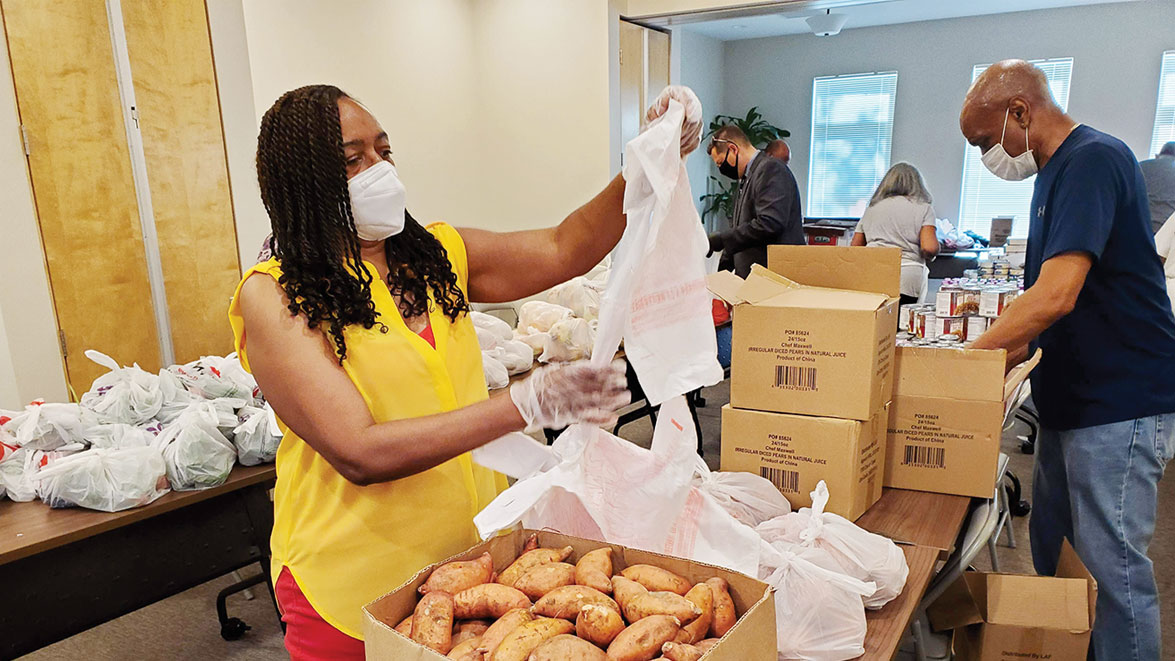
2020 has been a year unlike anything any of us have ever seen. In 2020 Maryland, hunger itself is hungrier than ever before. It’s reaching further and further into our communities, touching many for the first time — people we know, people we care about, people whose lives were upended, literally overnight, when COVID-19 emerged:
- The family down the street who has been quarantined in their home for most of this year, whose resources have been limited by both a lost job and reduced hours
- The kind senior who once made sure everyone else in the neighborhood was fed, now reaching out for herself
- The woman who worked hard, planning events at a local hotel, who is struggling to find another way to support her family
Because of the work of the Maryland Food Bank, fueled by empathetic donors like you, our neighbors affected by COVID-19 can feel a little more hopeful, and focus on rebuilding their lives, all because of your kindness.
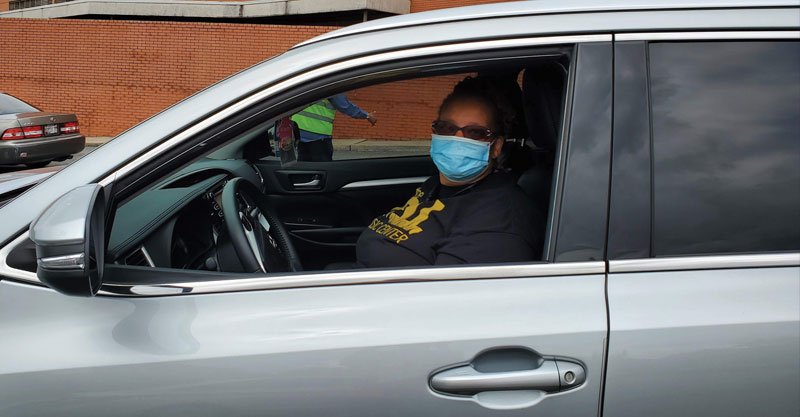
“Before COVID, I worked for Baltimore County Public Schools at Lakewood Elementary, helping give out food to families from the school pantry. With the virus, schools are closed, and there is no summer work available, so now I’m a recipient of food, for the first time in my life,” shared Shawn M., a grandmother trying to help her family get by.
We met Shawn in the parking lot of Mount Pleasant Church in northeast Baltimore on a 92-degree day in early September. She was one of nearly 750 food-insecure Marylanders patiently waiting in a serpentine line of vehicles to receive a supply of shelf-stable food and fresh produce to take back to the home she currently shares with her six grandchildren.
Like all of us, Shawn is hopeful that things will return to normal soon. She misses not only her independence, but the opportunity to help those she cares about.
“Once this passes and we get back in those school buildings, I’m going to keep on giving and giving.”
MFB’s Phase 2 COVID-19 Response Plan
Last spring, your generosity allowed us to blanket the state with food in response to the historic need brought on by the first wave of the virus, but based on conversations with economists, public heath experts, and disaster response professionals, we know we’re going to have to maintain this high level of food distribution for the foreseeable future.
That’s why, as part of Phase 2 of MFB’s COVID-19 Response Plan, the food bank is now concentrating on expanding food access to those who are struggling most as a result of COVID-19, including Marylanders who:
- Are newly unemployed or underemployed due to COVID-19-related closures and layoffs
- Are homebound or self-quarantined/quarantined or caring for sick family members and cannot safely leave their house to access food
- Are members of communities of color, whose historic challenges with systemic racial disparity and injustice have only been exacerbated by the effects of COVID-19
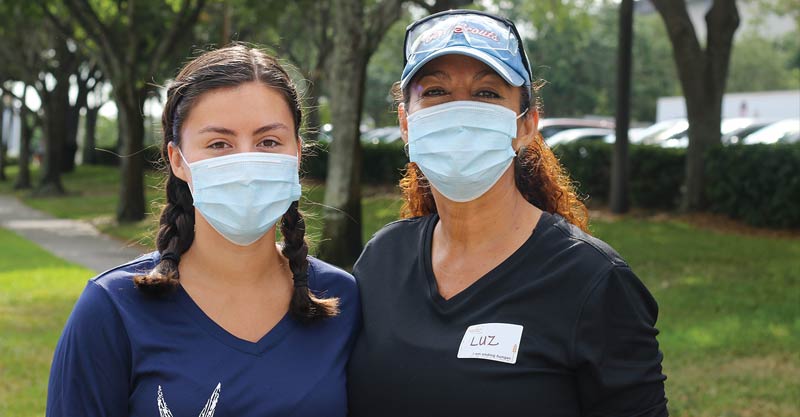
Offering a Hand Up, When Opportunities are Down
Federal funds have delayed the full economic impact of COVID-19, and low-wage, hourly, and gig workers are likely to be heavily impacted in the long term. Providing assistance to Marylanders suffering from a loss of work or hours is essential to helping our state recover.
JEFFREY K. Male breast cancer survivor and cardiovascular disease sufferer Jeffrey was a busy Uber driver, while his wife worked full-time at Johns Hopkins Hospital. The couple was able to manage the bills for their family of four, until COVID-19 derailed things. Jeffrey’s concern for his compromised health, combined with the state’s Stay at Home order, saw his weekly passenger volume drop by 75 percent. His wife’s position at the hospital was furloughed, and suddenly, the family found themselves in a troublesome situation.
However, asking for help did not come easy for Jeffrey.
“We always had a great income, never been food insecure before, but my pride got in the way – I know there are people out there who are less fortunate than my family is,” he said.
Until the economy improves, Jeffrey expects to continue visiting the pantry at Holy Nativity Lutheran Church in Arbutus, Md as needed.
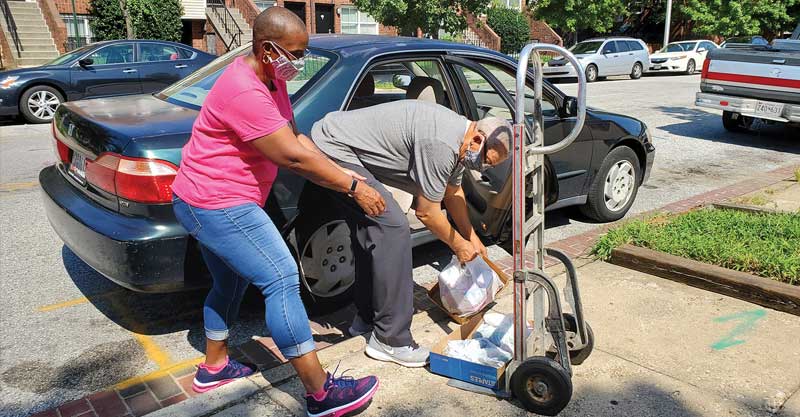
KATRINA W. Married with four girls under the age of 12, Katrina and her husband immigrated to the United States five years ago in search of employment and better opportunities for their family.
They both found positions helping others — Katrina as a heath care aid, and her husband as a technician at a local dialysis center. They both were working full-time when COVID-19 struck, and as fewer patients came in, it meant fewer hours for them. Hearing concern about their continued ability to provide for their family, a friend suggested they visit a food pantry run by the Asbury Church Assistance Network (ACAN) in Severna Park, Md.
“ACAN is able to provide us with some basic needs, which allows us to save money and put it into some other things that are needed,” said Katrina.
They fear that if things continue, they could lose their jobs entirely. But Katrina, like many other Marylanders whose income has been affected by this pandemic, finds solace knowing that the food assistance safety net will be there for her family.
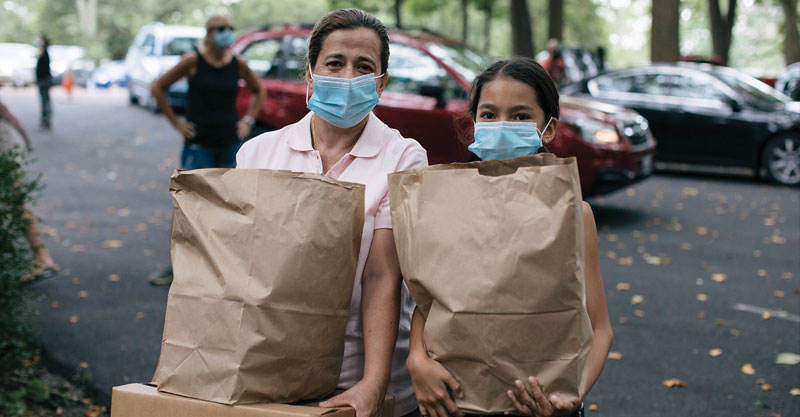
“The food we get really stretches for the whole week, especially the produce and fruits. Those
are the things that we really look forward to.”
Delivering Food, Offering Hope
“In addition to the quarantine restrictions placed on those who test positive or are exposed to the virus, vulnerable populations (seniors, immune-compromised individuals, etc.) who self-quarantine need to have food delivered. Home delivery benefits the affected individuals and families while keeping the whole community safe.
EMILY H. “I am retired, and only have $27 in my bank account. COVID made me postpone hip replacement surgery, and getting around is really difficult now,” said Emily H., a senior food recipient from The Door pantry in east Baltimore.
For nearly 50 years, Emily worked hard in various office roles, and proudly provided for herself. She was in a comfortable enough situation that she even volunteered at 40 West, an MFB Network Partner.
“I used to help with the produce drops at 40 West, and I never expected to be on the other side of the line. Food is a must, and you have to humble yourself to receive it,” she added.
While postponing the surgery forced Emily to spend some of her limited funds on a walker and other medical items to manage her condition, she remains positive.
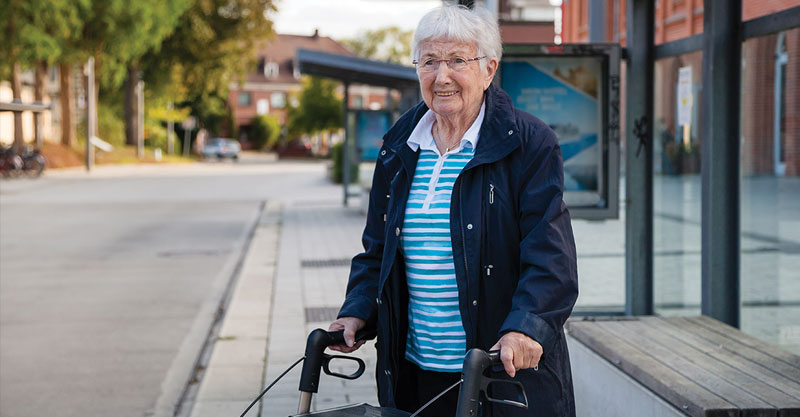
“Everyone thinks that this is something you never would have to do for yourself, but times change. And I’m thankful that the Maryland food Bank is able to help people like me.”
We Need Your Help
Programs, campaigns, and educational outreach at the Maryland Food Bank has always relied on the philanthropic support of charitable individuals like you.
Much like our food distribution efforts, outreach activities at the Maryland Food Bank rely on generous donations of money and time.
We hope you’ll consider a contribution.







